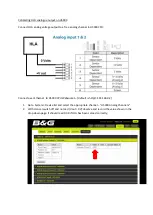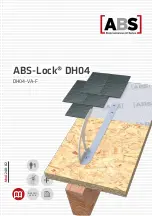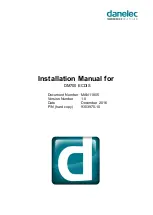
44
CHAPTER 4: ELECTRICS
QUICK LOAD SERVO S3T
4.
INTERFACE
Before connecting, check to make sure that the voltage of the bar feeder corresponds to
the one provided by the lathe. The voltage of the bar feeder is indicated on the
identification plate. Only LNS (or certified) technician is authorized to modify the
interface or parameter system.
4.1. Description
The interface cable(s), between the bar feeder and the lathe is (are) provided by LNS.
Although an example of an interface diagram is provided, the diagram for the interface corresponding to
your device, essential when making the electrical connection, is located inside the electrical cabinet.
When making connections, ensure that the cables are long enough to allow the entire travel of the
retraction system (600 mm) to be used.
Should the interface instructions not be observed during start-up, the damaged elements
as well as the resulting damages are not covered by warranty.
4.2. Connections
4.2.1. Power supply
Voltage:
3 x 200-480 V, 50 Hz/60 Hz + Ground (± 10%)
Maximum current:
1 A
In the case where the voltage supplied by the lathe does not match that provided for the bar feeder, the
transformer T1 must be adapted.
LNS bar feeders are equipped with their own thermal protection systems (breakers, thermal relays, fuses,
etc.). The power supply for the bar feeder should be connected to the output of a breaker mounted in the
electrical control box of the lathe (10 A max.).
For the wiring inside the lathe, the section of the cables should be at least 1.5 mm
2
.
4.2.2. Signals from the lathe to the bar feeder
Always refer to the electrical diagrams shipped with the bar feeder and placed in the electrical cabinet.
For any other type of connection, contact LNS or its local representative.
a)
24 V power supply
Corresponds to the +24 V of the bar feeder. This power shall be used to connect the signals from the
lathe to the PLC.
•
All signals from the lathe to the PLC shall be powered by the +24 V of the bar feeder.
•
All signals from the bar feeder to the lathe shall be powered by the +24 V of the lathe.
For the other types of connections, please contact LNS S.A. or their local representative.
b)
"EMERGENCY STOP" signal of lathe XT8-XT9
This signal is part of the safety link (Emergency Stop circuit) on the bar feeder.
XT8-XT9 corresponds to the Emergency Stop signal of the lathe. If the circuit is open, the bar feeder will
go into an Emergency Stop mode.
When the lathe is in an Emergency Stop mode, or if the safety line of the bar feeder is interrupted, an
alarm will sound and the R1 relay of the bar feeder will be triggered (see description of the R1 relay,
below).
Summary of Contents for SERVO S3 T
Page 2: ......
Page 5: ...CHAPTER 1 BASIC PRINCIPLES 3 QUICK LOAD SERVO S3T CHAPTER 1 BASIC PRINCIPLES...
Page 11: ...CHAPTER 2 TECHNICAL DATA 9 QUICK LOAD SERVO S3T CHAPTER 2 TECHNICAL DATA...
Page 18: ...16 CHAPTER 2 TECHNICAL DATA QUICK LOAD SERVO S3T...
Page 19: ...CHAPTER 3 SYSTEM START UP 17 QUICK LOAD SERVO S3T CHAPTER 3 SYSTEM START UP...
Page 35: ...CHAPTER 4 ELECTRICS 33 QUICK LOAD SERVO S3T CHAPTER 4 ELECTRICS...
Page 45: ...CHAPTER 4 ELECTRICS 43 QUICK LOAD SERVO S3T 3 ELECTRIC DIAGRAMS...
Page 49: ...CHAPTER 5 PNEUMATICS 47 QUICK LOAD SERVO S3T CHAPTER 5 PNEUMATICS...
Page 54: ...52 CHAPTER 5 PNEUMATICS QUICK LOAD SERVO S3T...
Page 55: ...CHAPTER 6 GENERAL DESCRIPTION 53 QUICK LOAD SERVO S3T CHAPTER 6 GENERAL DESCRIPTION...
Page 73: ...CHAPTER 7 OPERATION 71 QUICK LOAD SERVO S3T CHAPTER 7 OPERATION...
Page 105: ...CHAPTER 8 MALFUNCTIONS MAINTENANCE 103 QUICK LOAD SERVO S3T CHAPTER 8 MALFUNCTIONS MAINTENANCE...
Page 116: ...114 CHAPTER 8 MALFUNCTIONS MAINTENANCE QUICK LOAD SERVO S3T...
Page 117: ...CHAPTER 9 APPENDICES 115 QUICK LOAD SERVO S3T CHAPTER 9 APPENDICES...
















































